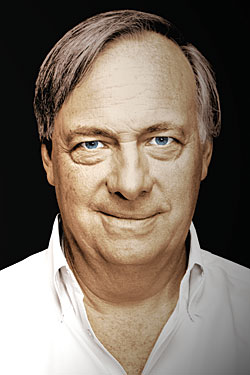 |
(Photo: Matthew Furman. Photo treatment by Gluekit) |
If you want to understand Bridgewater Associates, the world’s largest and indisputably weirdest hedge fund, you might start with the story of the peas.
It goes like this: In 2005, while the rest of the financial sector was busy pumping rocket-grade helium into the credit bubble, a young Bridgewater investment associate named Holden Karnofsky was complaining to his colleagues about the food at the firm’s Westport, Connecticut, headquarters. Particularly bad, he said, were the peas in the cafeteria salad bar. At other offices, a bottom-rung underling would probably shrug off such a misfortune and move on to the grape tomatoes, but Karnofsky, who came to Bridgewater via Harvard, felt empowered to post his grievance on the firm’s internal message board. “I didn’t mince words,” Karnofsky recalls. “I told them there was a lot that needed improving.”
Lousy peas may seem inconsequential when billions of dollars are being wagered. But at Bridgewater, a pea is never just a pea. Karnofsky’s complaint made its way to Ray Dalio, Bridgewater’s founder, chief executive, and chief investment officer, who brought it up with other members of the firm’s executive team. According to a person familiar with the episode, Hope Woodhouse, then Bridgewater’s chief operating officer, chided Dalio for paying so much attention to a vegetable mishap, saying, “This is ridiculous. I shouldn’t be spending my time on this.”
Dalio disagreed. He’s decreed that at Bridgewater—which has 1,100 employees and a stupefying $94 billion under management—there is no such thing as a small problem. “By the time I left,” says Karnofsky, “the food definitely got much better.”
Dalio, a tall, gaunt 61-year-old man with a swoop of gray hair, is an adherent of “radical transparency,” a management theory that calls for total honesty and accountability. He’s also a longtime practitioner of Transcendental Meditation and has built its precepts on self-actualization into Bridgewater’s office culture. (He’s even brought in David Lynch, the film director and unofficial TM spokesman, to lead a seminar for his staff.) Dalio expects employees to openly criticize not just the cafeteria fare but also each other; behind-the-back gossip is strictly prohibited. “Issue logs” track mistakes ranging from significant (poorly executed trades) to small (one employee is said to have been issue-logged for failing to wash his hands after a trip to the bathroom) and can result in “drilldowns,” intense sessions—one insider compares them to a cross between a white-collar deposition and the Spanish Inquisition—during which managers diagnose problems, identify responsible parties (“RPs,” in Daliospeak), and issue blunt correctives. Other employees can withdraw recordings of these proceedings from the firm’s “transparency library.”
Should Bridgewater employees need a refresher on the house rules, they can consult their copy of Principles, the 110-page manifesto Dalio has written to codify his philosophies about life, work, and the pursuit of greatness. The book used to be given to all Bridgewater employees in paper form and is now distributed via a custom app. Dalio’s axioms are studied with Talmudic intensity at the firm, and conversations with employees tend to be sprinkled with company jargon: “ego-barrier,” “probe,” and the ultimate Bridgewater insult, “suboptimal.”
“Empathy and kindness aren’t a top priority there,” says a former Bridgewater employee. The firm’s culture of absolute candor is designed to strip out emotional considerations and emphasize cold, Vulcan logic in all decision-making—the thin-skinned need not apply. But firm loyalists insist it sounds worse than it is. “Every organization is absolutely riddled with problems,” says one, “but we have a way of fixing them.” Dalio’s Principles, acolytes say, allow the firm’s researchers and traders to sidestep office politics and ego-stroking and focus on what really matters: beating the markets.
Which Bridgewater has certainly done. Last year, the firm put up the best numbers in its 36-year history, notching a nearly 45 percent gain in its most aggressive fund on its way to a total haul of more than $15 billion. Those returns—which CNBC noted were greater than the 2010 profits of Google, Amazon, Yahoo, and eBay combined—vaulted Bridgewater even further ahead in the hedge-fund rankings and reportedly netted Dalio a personal windfall of more than $3 billion.
Post-Madoff, billion-dollar paydays have a way of putting targets on backs, especially amid the insider-trading scandals now hitting the hedge-fund sector. “They’re just out there in Connecticut, not really part of the scene,” says one Goldman Sachs employee. “But they had a killer year, and with that big a fund …” The Goldmanite trails off. “What do they do? No, seriously. Do you know?” Bridgewater makes it hard to answer that question. Like a lot of hedge funds, it requires its employees to sign nondisclosure agreements designed to keep trading strategies under wraps. Even more than its peers, it cultivates a paranoia in its ranks, monitoring e-mails and phone calls and keeping tabs on employees via a network of overhead cameras. Most of the current and former Bridgewater employees contacted for this article, along with several nonstaffers who were afraid of angering the firm, spoke on the condition of anonymity. But nobody is accusing Dalio of misconduct, and Bridgewater’s reputation among institutional investors is spotless—a recent survey by analytics firm Preqin ranked the firm as the global favorite of public-pension funds.

